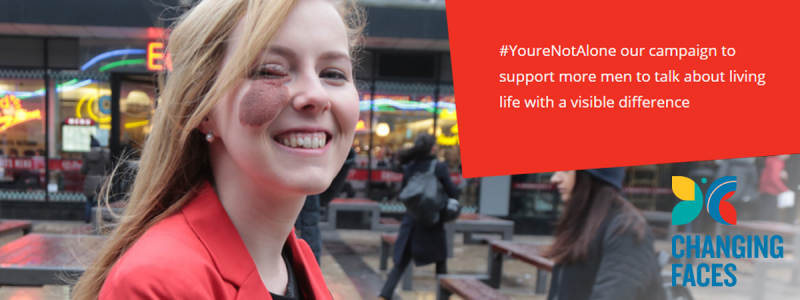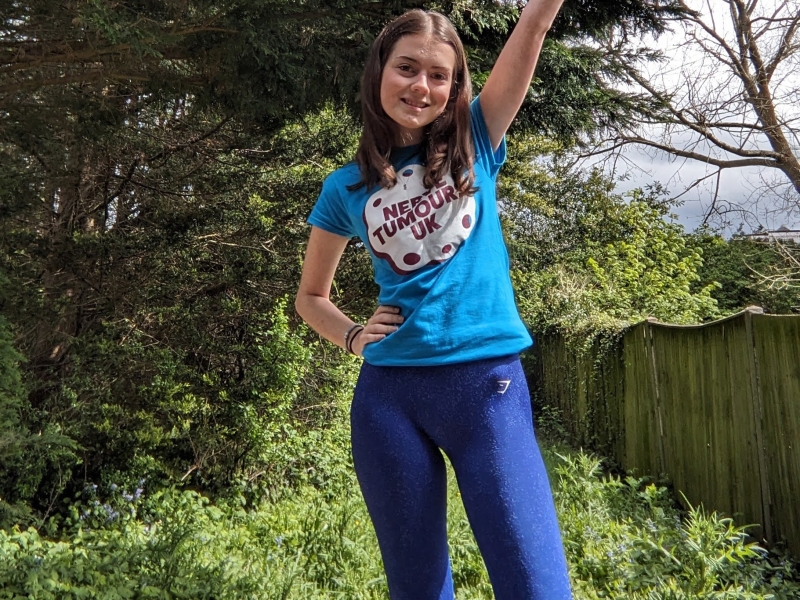Voices of Visible Difference #YoureNotAlone Men’s Campaign
30 September 2020
Voices of Visible Difference: Episode 4 Our #YoureNotAlone Men's Campaign
Over the next five days, Changing Faces is going to be focussing on the experiences of men with visible differences. Through their #YoureNotAlone men’s campaign, Nerve Tumours UK will be sharing their voices encouraging more men to seek appearance related support and featuring real stories of men living life with a visible difference. Currently only around 2 in 10 clients Changing Faces supports are men. The campaign is part to highlight existing support to men that are affected.

New research reveals two-thirds of men with a visible difference feel embarrassed, worried or afraid because they look different.
New survey of over 1,000 men with a visible difference by charity Changing Faces reveals:
Three-quarters of men with a visible difference say men are under pressure to meet macho male stereotypes (76%) and that men do not talk about their appearance (75%)
Nearly three-quarters of men (72%) say there should be more conversations among men with visible differences
A quarter (23%) of men with a visible difference feel self-conscious or embarrassed about showing parts of their body
Two-thirds (64%) of men with visible differences felt negative emotions, such as being embarrassed, worried or afraid, when they realised they looked different
Three-quarters of men with a visible difference say men are under pressure to meet macho male stereotypes and a quarter say they feel self-conscious or embarrassed about showing parts of their body. That’s according to the charity Changing Faces whose new research reveals six in ten men with a visible difference agree people react differently to a man with a visible difference than a woman.
The survey conducted by Savanta ComRes of over 1,000 men with a visible difference, such as a mark or scar, highlights how men with a visible difference are contending with a double challenge; handling the reactions of others, and living in a society where talking about appearance is still more acceptable for women than men.
Two-thirds (64%) of men with visible differences felt negative emotions, such as being embarrassed, worried or afraid, when they realised they looked different.
– Changing Faces CEO, Becky Hewitt"Looking different in a society that promotes and values ‘perfection’ is tough and it’s no wonder that men find it difficult to speak out about their experiences. All too often men with disfigurements are portrayed negatively, with scars often used as a shorthand for villainy.
Added to that there’s a prevailing attitude that men should ‘just get on with it’, and not worry about how they look. It’s a toxic blend that doesn’t help people who could really benefit from support."
The research found that three-quarters of men with a visible difference say men do not talk about their appearance but agreed that there should be more conversations among men.
– Changing Faces Campaigner, Rory McGuire"When you look different you have to be ready for daily stares and comments. That takes its toll, particularly if you don’t feel able to talk about how it makes you feel.
In my late teens I eventually started to speak out. At first, I shared my experiences online. I had positive reactions from all over the world, and closer to home, people realised the impact of appearance related bullying and abuse. Things started to change for the better.
We need men, and women, to know that it’s okay to talk about your appearance, and how other people’s reactions can make you feel."
The research also found that a quarter (23%) of men with a visible difference feel they are a stronger person because of looking different.
– Changing Faces Ambassador and Actor, Adam Pearson"When I look back at the young man I was, to the person I have become, I am very proud of him. It’s not always easy looking different in a world that is so focused on perfection.
Growing up there were no positive role models of people with disfigurements in the media. So now I’m on a mission to be more visible. I speak out and share my experiences, because if it helps one more man, or woman, feel able to share how they’re feeling about their appearance, that’s a job well done."
Changing Faces say currently only around 2 in 10 of the clients they support are men and have launched a campaign to encourage more men to come forward and access support services, such as free one-to-one counselling, peer group chat and an online self-help programme.
Hear more from men with visible differences
Changing Faces campaigners and ambassadors have been sharing their experiences of being a man and living life with a visible difference in the latest My Visible Difference podcast out now, guest hosted by Changing Faces ambassador Adam Pearson.
Filter News

Kelly’s Story
Find out how Kelly discovered her confidence after overcoming testing years at school and college.
Read More
Awareness Walks
Raise awareness with an organised walk within your community. We've put together some pointers to help you with planning.
Read More
Meena’s Awareness Raising Coastal Walk
NTUK trustee Prof. Meena Upadhyaya treks the Welsh coast to raise awareness of NF and rare diseases.
Read More
Breast Cancer in Neurofibromatosis Type 1
Professor Gareth Evans takes us through a summary of the current research around the links between NF1 and breast cancer
Read More_800_600_s_c1.jpg)
Bromley NF1 Info Day 2024
Join us for an insightful NF1 Information Day in Bromley on November 23, 2024. Expert talks, Q&A, and community connection.
Read More
Joanna’s Story
Joanna updates us on her breast cancer diagnosis, and how she's going above and beyond in her fundraising and fitness.
Read More_800_600_s_c1.jpeg)
Andrea’s Story
Andrea shares her long journey for an NF diagnosis and why she wants her story out there.
Read More_800_600_s_c1.png)
Advice for Students with NF1, NF2-Schwannomatosis, and Schwannomotosis
Expert advice, information and resources to help you get the most from university.
Read More

